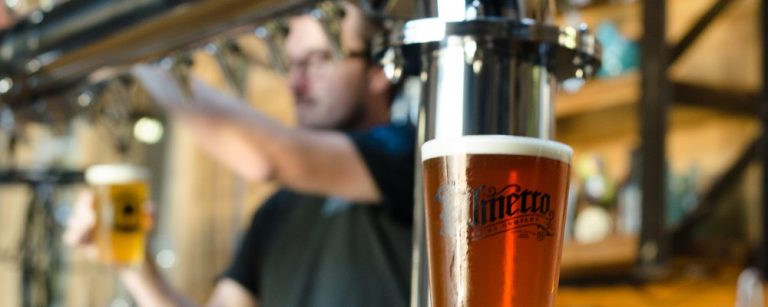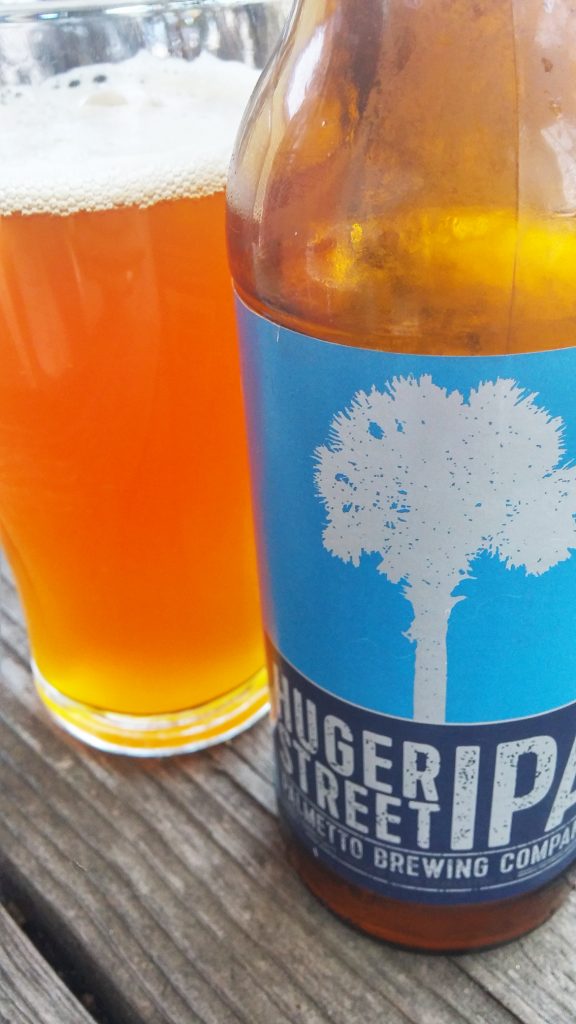Palmetto Keeps Charleston Brewing Legend Going Strong
Palmetto Brewery opened just before the Civil War, once brewing a special Earthquake Beer following a quake that destroyed buildings downtown. More than 100 years (and one Prohibition) later, Palmetto Brewing Company opened in 1993 to reclaim a tradition that had died in Charleston, S.C., in 1920.
Palmetto Brewing Company was the first brewery to open in Charleston following Prohibition, and has continued through the burst beer bubble of the 1990s and the current rise that has the U.S. on pace to possibly top 5,000 total breweries by year’s end.
I recently was lucky enough to sample two Palmetto beers: the tasty, medium-bodied Huger Street IPA (the brewery is located at 289 Huger Street in Charleston) and the spring seasonal Colonel Rathbun’s Farmhouse Ale, a crisp and lightly fruity brew which features locally-grown persimmons.
I caught up with Palmetto’s Collin Clark, Certified Cicerone, and grilled him about the beers and what’s ahead for brewing and Palmetto.
Kevin Gibson: Do you often use local/regional ingredients in your beer?
Collin Clark: Yes! We source local whenever possible. It’s a long-running joke in the brewing world that the only ingredient many breweries can source locally is water. The truth is that primary beer ingredients – barley and hops – only grow well in specific regions. Charleston is not home to any significant hop or barley cultivation, so we rely upon our seasonal brews and adjunct ingredients to showcase our “drink local, be local” mentality. Colonel Rathbun’s and beers like it are the perfect opportunity to showcase what the South Carolina Lowcountry has to offer – like those beautifully complex Hachiya persimmons.
KG: In a market that is more packed with competition than ever, what do you do to try and stand out?
CC: We hold true to the same dedication that Palmetto has always embraced. We were founded with a mission to produce the finest ales and lagers, and we’ve been guided by our “Enjoy With Food and Friends” slogan from the start. This slogan continues to guide the brewery today. We want to produce well-rounded, enjoyable beers that bring friends and family together. We think this commitment shines through in the beer and really speaks for itself.
KG: Palmetto was the first brewery to open in Charleston since Prohibition. You saw the bubble pop in the late 1990s and have watched the re-emergence of quality beer. To what do you owe your longevity and success?
CC: Dedication to the craft has fueled Palmetto’s success since the beginning. It’s this same dedication that will drive our future growth and expansion. All that we do, we do for the love of craft beer and craft beer drinkers.
KG: It's an IPA-crazy market right now. Do you see this changing?
CC: Our Huger Street IPA entered year-round production primarily because many of us here at Palmetto wanted a year-round IPA. We have always produced seasonal examples of the style, but Huger Street IPA was the first IPA to gain a spot in our year-round portfolio. It’s hard to deny that many of today’s beer enthusiasts are hooked on the IPA, but we wanted to deliver an IPA a bit unlike many others on the market. After months of development, Huger Street IPA was the result. This beer bucks the trend of “more IBUs” in favor of a more complex hop profile rich in citrus and floral notes. The inclusion of some wheat in the grain bill softens and balances the hop bitterness. We’ve found that it appeals to both the hop-head and general craft beer drinker alike.
KG: Where do you see the future of craft beer headed in the U.S.?
CC: We’re seeing a return to local and regional brewing in many cases. With more breweries in the U.S. than ever before, folks are now able to find their favorite brew a little closer to home. We won’t speculate on the future of beer market at large, but we have big things planned for Palmetto in the coming months and years.



